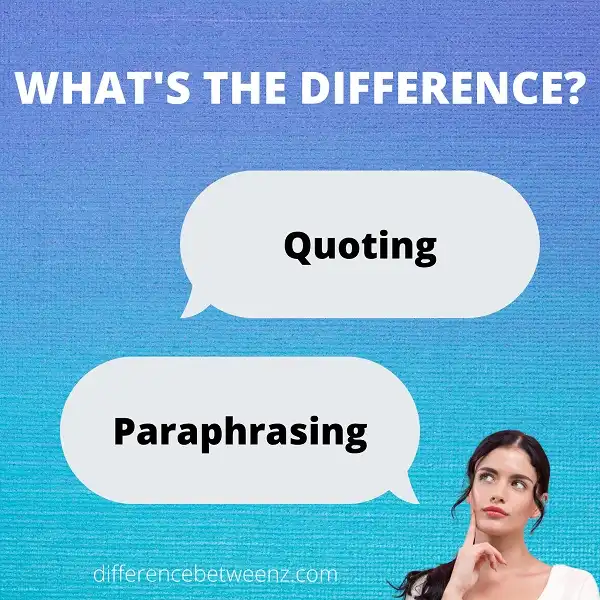There is a big difference between quoting and paraphrasing, and it’s important to know the difference when writing papers. Quoting involves using the exact words of another author, while paraphrasing means putting those words into your own words. When quoting, you must use quotation marks and cite the source; with paraphrasing, you do not need to include quotation marks but still need to cite the source. Paraphrased passages must be shorter than quoted passages. It’s important to use both techniques appropriately in order to give credit where credit is due and avoid plagiarism.
What is Quoting?
Quoting is the practice of repeating or copying out an exact piece of text from a source, often with an indication that one is not the original author. Quotes are most often used in academic writing, where they are used to support an argument or add weight to a point being made. Quotes can also be used in other types of writing, such as journalism, advertising, and creative writing. However, it is important to use quotes sparingly and only when they add value to the text. Overusing quotes can make your writing feel disjointed and can even make you seem lazy or unoriginal. When used correctly, however, quotes can be a powerful tool for adding depth and authority to your writing.
What is Paraphrasing?
Paraphrasing is the process of rewriting a piece of text in your own words. When paraphrasing, it is important to keep the original meaning of the text intact and to avoid simply copying and pasting sections of the original text. Paraphrasing can be useful when you want to summarise a complex piece of writing, or when you want to make an argument more accessible to your audience. When done well, paraphrasing can help to improve the clarity of your writing and make your argument more persuasive. However, it is important to be careful when paraphrasing, as it is easy to accidentally introduce errors or change the meaning of the original text. If you are unsure about how to correctly paraphrase a piece of text, it is always best to consult with a professional editor or proofreader.
Difference between Quoting and Paraphrasing
Quoting and paraphrasing are both effective ways to use another author’s words in your own writing. Quoting involves copying the exact words from the original source, while paraphrasing involves rewriting the original text in your own words. Both methods can be used to support your arguments and add credibility to your writing. However, it is important to use each method correctly. Quoting should be used sparingly, as too much-quoted material can make your writing sound choppy and difficult to read.
Paraphrasing, on the other hand, can be used more liberally. However, it is important to make sure that you accurately represent the original author’s ideas when paraphrasing. If you change the meaning of the original text, or fail to give credit to the author, you could be accused of plagiarism. Ultimately, whether you quote or paraphrase will depend on your specific needs and the requirements of your assignment.
Conclusion
Whether you’re a student writing a research paper or an entrepreneur blogging to increase website traffic, it’s important to understand the difference between quoting and paraphrasing. Quoting is when you use another person’s words verbatim, while paraphrasing is when you restate someone else’s ideas in your own words. Both have their place in academic and business writing, but it’s important to use them correctly. Misusing quotes can lead to accusations of plagiarism, while paraphrasing incorrectly can distort the author’s original meaning.


